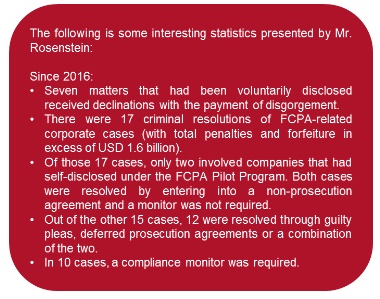FCPA Corporate Enforcement Policy
On November 29, 2017, in his speech at the 34th International Conference on the FCPA in the Washington, DC metropolitan area, Deputy Attorney General Rod J. Rosenstein announced a new FCPA Corporate Enforcement Policy that replaced the FCPA Pilot Program of April 2016. This new policy was made a permanent part of the United States Attorneys' Manual (Title 9-47.120), assuring more uniformity in its application by US prosecutors.

The new policy is an improvement as compared to the FCPA Pilot Program that had already shown positive results, according to the DOJ. In fact, as Mr. Rosenstein stated, during the 18 months in which the FCPA Pilot Program was in effect, there were 30 voluntary disclosures to the DOJ's FCPA Unit compared to only 18 disclosures in the 18 months before the program had been put in place.

Most notably, the new policy provides for a presumption of declination for companies that voluntarily disclose misconduct in FCPA matters, fully cooperate, and appropriately remediate, absent aggravating circumstances. The new policy also provides additional credits to companies that self-disclose and cooperate with the US government, as explained below.
Credits
Along with the requirements of self-disclosure, cooperation and remediation, the new policy sets forth rules about credits in two scenarios.
The first scenario relates to a company that voluntarily self-disclosed, fully cooperated with the authorities and timely and appropriately remediated the deficiencies found. In this case, there are two possibilities:
- Absent any aggravating circumstances related to the seriousness of the offense or the nature of the offender (as specified below), there will be a presumption that the company that fulfills the requirements of the new policy will receive a declination, which will be made public;
- If there are aggravating
circumstances (such as involvement by executive management of the
company in the misconduct, a significant profit to the company from
the misconduct, pervasiveness of the misconduct within the company
or criminal recidivism):

- The DOJ will accord or recommend a 50% reduction off of the low end of the US Sentencing Guidelines (U.S.S.G.) fine range, except in the case of a criminal recidivist.
- Generally, the DOJ will not require the appointment of a monitor, as long as the company has implemented an effective compliance program at the time of the resolution.
The second scenario refers to a limited credit if the company did not voluntarily self-disclose but, once the investigation was ongoing, fully cooperated and timely and appropriately remediated. In that situation, the company will receive or the DOJ will recommend up to a 25% reduction off of the low end of the U.S.S.G. fine range.
Finally, the new policy includes definitions and comments on key concepts such as cooperation, thus allowing for more objectivity and consistency in its application and more transparency in the Department's decisions, which helps to eliminate uncertainties and to avoid an excessively discretionary enforcement.
It is still unknown how this new policy will affect the decisions taken by the DOJ to address specific violations. However, the rules in the new policy bring more clarity and guidance and should definitely be taken into consideration when companies decide how to approach the DOJ.
The content of this article is intended to provide a general guide to the subject matter. Specialist advice should be sought about your specific circumstances.


